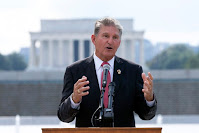According to Law360, Sen. Joe Manchin said on Wednesday, July 27, 2002, that he had reached an agreement with Majority Leader Chuck Schumer on legislation that would impose a 15% corporate minimum tax as part of a larger package to address tax, energy and health care costs.
Manchin, a Democrat from West Virginia, and Schumer, a Democrat from New York, announced the agreement to add the package, known as the Inflation Reduction Act of 2022, to the fiscal year 2022 budget reconciliation bill, which could be passed with a simple majority. The package includes key parts of President Joe Biden's stalled domestic agenda such as investing in renewable energy and lowering the cost of health insurance and prescription drugs.
The measure would bring in roughly $739 billion in new revenues, including:
- $313 billion from establishing a corporate minimum tax,
- $124 billion from increased tax enforcement efforts by the Internal Revenue Service,
- $14 billion from changing the tax treatment of carried interest and
- $288 billion from reducing the cost the federal government pays for prescription drugs, according to a summary provided by Schumer's office.
Would Apply To Adjusted Financial Statement Income For Corporations With Profits In Excess Of $1 Billion,
Effective After December 2022.
Corporations would generally be eligible to claim net operating losses and tax credits against the AMT, and would be eligible to claim a tax credit against the regular corporate tax for AMT paid in prior years, to the extent the regular tax liability in any year exceeds 15% of the corporation's adjusted financial statement income.
The funding also would lower health care premiums by $64 billion and provide the IRS with an additional $80 billion to pay for the enforcement efforts. Approximately $15 million of the IRS funding would be used to study the creation of a free electronic filing program for low- and moderate-income taxpayers.
"It is common sense that a domestic corporate minimum tax of 15% be applied only to billion-dollar companies or larger, ensuring that America's largest businesses are no longer able to operate for free in our economy," he said.
Roy Blunt, R-Mo., chair of the Senate Republican Policy Committee, said he probably wouldn't support the Manchin-Schumer legislation, which he hadn't seen yet.
"I don't think raising taxes is the right thing to do right now or putting more money into the economy," Blunt told Law360.
The agreement with Schumer follows comments Manchin made during a West Virginia radio interview July 15 that he wouldn't support the tax proposals in Biden's economic plan and that a significant increase in inflation led to his decision. Manchin said his support for a slimmed-down version of the Build Back Better Act, the budget reconciliation bill the House passed in November, had depended on a consumer price index report that showed a 9.1% increase in June over the prior year.
Manchin has featured prominently in the debate on the Build Back Better Act. In December, he opposed the measure. Manchin said he was concerned about its effect on inflation and the national debt, said he couldn't support the proposal, and pointed to other concerns like the pandemic as issues Congress should focus on.


.jpg)




No comments:
Post a Comment